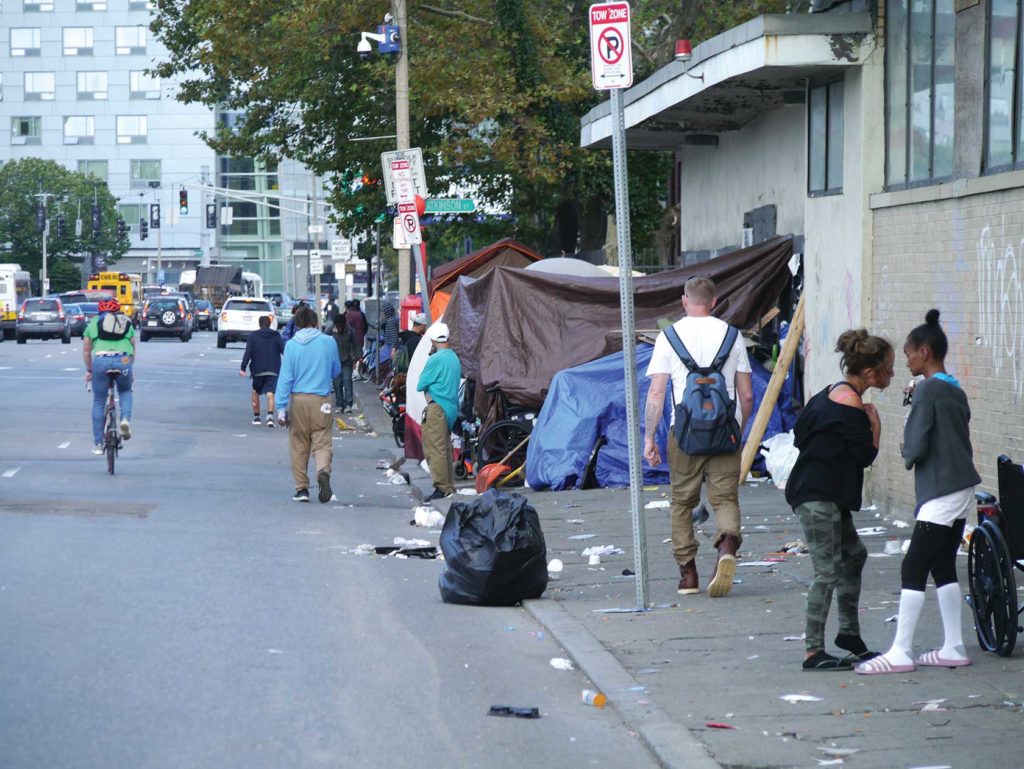
A group of Massachusetts elected officials are calling on state and local law enforcement to execute a sweep of outstanding criminal warrants and to clear people with mental health issues and substance use disorder from the corridor near Melnea Cass Boulevard and Massachusetts Avenue, known as Mass. and Cass. To address “dangerous, inhumane and unacceptable” conditions in the area, elected officials also requested that authorities involuntarily commit people who are “suffering from mental health and substance abuse with a likelihood of serious harm to themselves or others.”
The letter — signed by Congressman Stephen Lynch, state Sen. Nick Collins, state Rep. David Biele, City Councilor Frank Baker and At-Large City Councilors Michael Flaherty and Erin Murphy — followed a community meeting in South Boston last week, where the elected officials say “serious issues were raised by concerned residents about public safety in South Boston and across the city,” emphasizing issues with human trafficking, drug trafficking and guns.
Sergeant Detective John Boyle, a spokesman for the Boston Police Department, said officers will continue to serve warrants in the area but they are not planning for a sweep. Mass. and Cass is regularly monitored by outreach teams from the city, security guards and teams of Boston Police officers, according to Boyle.
After a series of stabbings and other crime in the area in April, the Engagement Center on Atkinson Street — which was created to support those experiencing homelessness or seeking substance use treatment — was closed for five days. Since then, the Center has not operated at full capacity, and crowding on Atkinson Street has been prohibited. Crowds have gravitated toward Southampton Street, a more visible, highly trafficked area near several highway onramps.
“When people are more visible, that’s when they call for the removal, that’s when people complain about crowds hanging around,” said Heidi King, who experienced homelessness for over a decade at Mass. and Cass and returns for regular clinic appointments. “They don’t care about us, they’re just trying to remove us because they think we’re the problem.”
King says additional warrant sweeps are unlikely to reduce crime unless authorities become more actively engaged with the situation on the ground. She said she was assaulted by a man on Atkinson Street last summer and saw no police intervention. “They literally just stand there and just watch the time go by and get paid for nothing,” said King.
Chrissy Joubert, an activist who has spent over seven years working with the homeless community on Mass. and Cass through her nonprofit Project Do Something Boston, agrees that police have a responsibility to protect not just the residents and businesses in the surrounding community, but unhoused victims of predators at Mass. and Cass as well. She says getting victims away from the area — into housing, detox or low-threshold safe houses for victims of domestic violence — would solve a lot of the concentrated crime.
“There are always going to be these people around, there’s crime all over the city, but when it’s near the South End, people blame the homeless,” Joubert said. “We need for the victims to be safe. If there’s no victim, there’s no people to prey on.”
Last month, Mayor Michelle Wu announced a “comprehensive warm weather plan” to prevent another encampment from forming in the area this summer. The plan includes efforts to reduce crowds, clean up surrounding streets and continue to connect people experiencing homelessness, substance use disorders and mental health issues with resources and detox programs. Additional security measures will also be taken to “promote [a] safe environment for accessing services at [the] Engagement Center,” though the center will operate on a limited basis, according to Wu.
The plan is an extension of the Wu administration’s efforts to secure temporary or permanent housing for people experiencing homelessness at Mass. and Cass, culminating in a sweep of the area in January. Though an estimated 164 people were moved into transitional housing in the weeks following the sweep, an estimated 100 others were left behind with no housing.
As part of the city’s new plan, six low-threshold housing sites that were established last January will continue to operate while the city works to create permanent locations, according to a press release from the city.
“We reiterate the need for partnership across the state and the region as we seek to expand temporary and permanent supportive housing beyond Boston,” Wu told reporters last month. “Additionally, we are looking to decentralize these services and ensure resources are available across our communities, not just in one part of the city.”
Tori Bedford covers Dorchester, Roxbury and Mattapan for GBH, 89.7.






